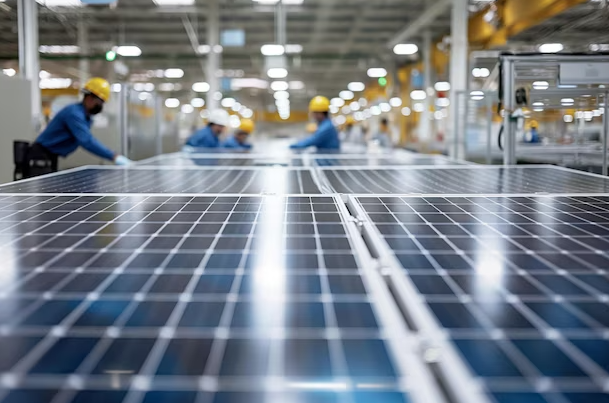

The U.S. Department of Energy (DOE) has granted a conditional loan guarantee of US$1.45 billion to Hanwha Qcells, a Korean-owned solar manufacturer, to support the development of its vertically integrated manufacturing facility in Cartersville, Georgia.

Image Source: FREEPIK
This loan, part of the DOE's Title 17 Clean Energy Financing program, will aid in the construction of a facility with a 3.3GW nameplate capacity. The plant will produce silicon ingots, wafers, cells, and modules, where aluminium is a common metal impurity mixed with silicon wafers. This is added to improve the ability of the devices to conduct electricity. This process is called doping.
With this, the plant also aims to become the largest vertically integrated solar manufacturing hub in the U.S. Qcells initially announced the Cartersville site in January 2023, with a total investment of US$2.5 billion. Qcells also operates a 5.1GW module production facility in Dalton, Georgia, and a solar encapsulant plant in Bartow County.
In an official statement, the DOE highlighted that the Cartersville facility would benefit from the Section 45X Advanced Manufacturing Credit and help customers access the domestic content bonus of the Investment Tax Credit, both provisions under the Inflation Reduction Act.
Use of aluminium in solar sector
Aluminium is vital in solar power systems and is used in components such as solar panel frames, mounting structures, and inverters. It is a key material in clean energy technologies, particularly in solar, where it makes up 85 per cent of photovoltaic (PV) components, mainly in the form of frames and mounting structures that support and hold the panels in place.
Aluminium's natural corrosion resistance makes it ideal for protecting solar panels. It shields solar modules from moisture, dust, rain, and other environmental factors. An aluminium solar panel frame also ensures proper water drainage and prevents debris accumulation on the panels, enhancing their durability and efficiency.
Aluminium is also integral to constructing solar farms and other solar energy projects. It is used in the frames and supports for solar panels and in the mounting systems that secure the panels. The benefits of aluminium in these applications include reduced weight and lower costs, helping to make solar energy projects more accessible and cost-effective.
Aluminium frames are widely used to provide support and protection for the panels. These frames are lightweight, strong and easy to manufacture, making them a preferred option for solar panel manufacturers. In addition, aluminium is employed in the electrical components of solar panels, such as wiring and connectors, due to its superior electrical conductivity.
Inclusion of solar wafers & ingots
The inclusion of solar wafers and ingots in the domestic content bonus has recently sparked debate within the U.S. industry. Several companies, spearheaded by the Solar Energy Manufacturers for America (SEMA) coalition, have called for revisions to the scheme to incorporate solar wafers in its calculations.
The domestic content bonus mandates that 40 per cent of a product's components (based on cost) be "US-made," with this threshold set to increase to 55 per cent next year. The Solar Energy Manufacturers for America (SEMA) has urged the U.S. Treasury to "recognise the individual value" of supply chain components, a move that would encourage investment in domestic wafer manufacturing capacity.
Qcells' Cartersville facility
As highlighted in a PV Tech Premium feature earlier this year, Qcells' Cartersville facility is one of the few reliable wafer manufacturing plants announced in the U.S. Since the Inflation Reduction Act (IRA) was passed, most manufacturing plans have focused on module production. In January, Qcells secured a 12GW multi-year module supply agreement with technology giant Microsoft, one of the largest long-term supply deals in the U.S. solar industry.
Recipients of LPO loans are required to develop and implement a Community Benefits Plan (CBP), which involves engaging with local communities and labour. The DOE stated that Qcells plans to collaborate with the Biden-Harris administration's Justice40 Initiative, which mandates that 40 per cent of the benefits from federal investments in the energy transition be directed to "disadvantaged communities" that have historically faced underinvestment.
In April, Qcells joined a group of U.S. solar supply chain manufacturers in filing an antidumping and countervailing duty (AD/CVD) petition with the Department of Commerce (DOC), aiming to limit imports of silicon solar cells from four Southeast Asian nations.



Responses






